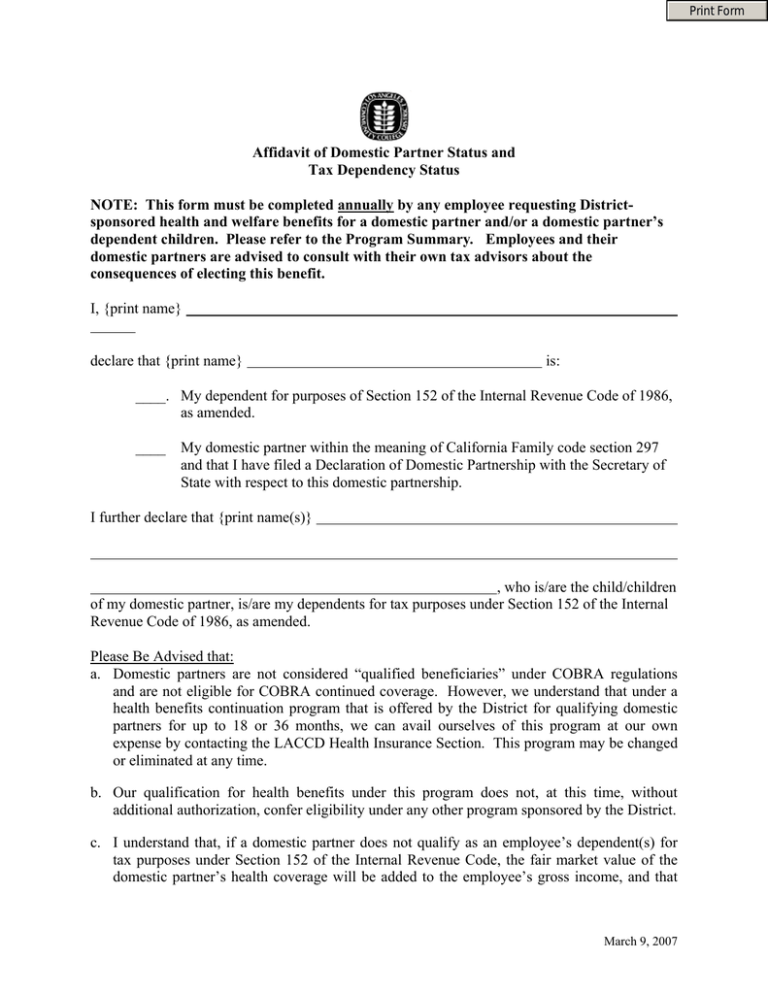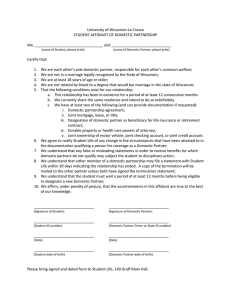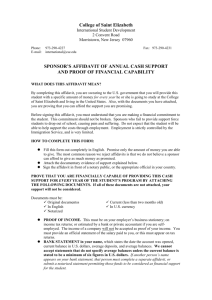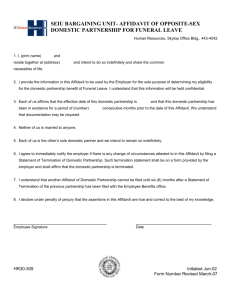Affidavit of Domestic Partner Status and Tax Dependency Status
advertisement

Print Form
Affidavit of Domestic Partner Status and
Tax Dependency Status
NOTE: This form must be completed annually by any employee requesting Districtsponsored health and welfare benefits for a domestic partner and/or a domestic partner’s
dependent children. Please refer to the Program Summary. Employees and their
domestic partners are advised to consult with their own tax advisors about the
consequences of electing this benefit.
I, {print name}
declare that {print name}
is:
____. My dependent for purposes of Section 152 of the Internal Revenue Code of 1986,
as amended.
____
My domestic partner within the meaning of California Family code section 297
and that I have filed a Declaration of Domestic Partnership with the Secretary of
State with respect to this domestic partnership.
I further declare that {print name(s)}
, who is/are the child/children
of my domestic partner, is/are my dependents for tax purposes under Section 152 of the Internal
Revenue Code of 1986, as amended.
Please Be Advised that:
a. Domestic partners are not considered “qualified beneficiaries” under COBRA regulations
and are not eligible for COBRA continued coverage. However, we understand that under a
health benefits continuation program that is offered by the District for qualifying domestic
partners for up to 18 or 36 months, we can avail ourselves of this program at our own
expense by contacting the LACCD Health Insurance Section. This program may be changed
or eliminated at any time.
b. Our qualification for health benefits under this program does not, at this time, without
additional authorization, confer eligibility under any other program sponsored by the District.
c. I understand that, if a domestic partner does not qualify as an employee’s dependent(s) for
tax purposes under Section 152 of the Internal Revenue Code, the fair market value of the
domestic partner’s health coverage will be added to the employee’s gross income, and that
March 9, 2007
this additional imputed income will be subject to all applicable Federal employment and
withholding taxes.
d. I understand that the District retains the right to modify or terminate the continuation of
health benefits at any time consistent with the Collective Bargaining Agreement.
I further agree that I will follow all regulations and perform any reporting obligations required by
the 2005-2008 Collective Bargaining Agreement although not mentioned anywhere else in this
application.
I certify under penalty of perjury that the above information is true and correct and I agree to
indemnify the Los Angeles Community College District for any losses, penalties, taxes or
damages which it incurs as a result of any false statement made by me in this Affidavit.
/
Employee Signature
Employee Address
City, State
Print Name Notary Public
Signature Notary Public
SEAL
/
Date
Commission Expires
Zip
/
/
FOR HEALTH INSURANCE SECTION USE ONLY
Date of Completion of Verification:
/
/
Verified By (print name):
Position Title:
Comments:
Appendix C
March 9, 2007
PROGRAM SUMMARY
OBJECTIVE
The primary objective of the program is to provide, to the extent permitted by current law, health
benefits to active members in domestic partner arrangements that are comparable to the benefits
program provided to employees in statutorily recognized spousal/family relationships.
The following is a summary of the program with pertinent information on qualifications and
instructions for any member interested in applying for domestic partners coverage. AN
APPLICATION WITH AFFIDAVIT AND REQUIRED DOCUMENTATION MUST BE
MADE WITHIN 31 DAYS FROM DATE OF ELIGIBILITY.
QUALIFICATIONS
To qualify for domestic partner coverage, the District active employee or retiree must satisfy the
following requirements:
1.
The employee must be a full-time equivalent “active” member of any unit employed by the
District or retired from District employment eligible for health benefits.
2.
The employee or retiree and domestic partner must file with the District Health Insurance
Section an Affidavit of Domestic Partnership signed by both partners and notarized, proof
of domestic partner or family association registration where applicable, and an Affidavit of
Domestic Partner Tax Dependency Status if necessary. (Note that the Affidavit of Domestic
Partnership imposes certain requirements in order for a relationship to be considered a
domestic partnership for purposes of domestic partner health coverage.)
3.
a.
The employee or retiree and his/her domestic partner must sign and file with the
Health Insurance Section a notarized affidavit form provided by the District (herein
attached as Appendix A) as evidence of the domestic partnership.
b.
If the employee or retiree resides in a jurisdiction which permits registration of
domestic partners, the employee must also show proof of this registration in order to
qualify his/her domestic partner for health benefits; otherwise, the partners must
register with the State of California as a family association and show proof of such
registration.
c.
The employee or retiree must execute an Affidavit of Domestic Partner Tax
Dependency Status in order to avoid paying tax on the value of the domestic partner
coverage. This is attached as Appendix E.
The employee or retiree must file with the District Health Insurance Section a completed
application form and an enrollment form. These are enclosed as Appendix B and Appendix
C.
March 9, 2007
4.
The application for domestic coverage must include all of the health plans in which the
employee or retiree is presently enrolled. (For example, the employee may not choose to
enroll the domestic partner under only the dental but not medical and vision care, etc.).
5.
The employee or retiree and his/her domestic partner (the “Applicants”) must meet the
following requirements:
1. The employee/retiree, and his/her domestic partner, must satisfy the eligibility
requirements of a domestic partnership established by the State of California, register with
the State of California as a domestic partnership and present proof of such registration, along
with proof of the following documentation to the Health Insurance Section, Business
Services Division:
a. Sharing a common residence, which may include proof by copies of driver’s licenses
or passports showing the same address;
b. Joint responsibility for each other’s basic living expenses incurred during the
domestic partnership which shall mean the cost of food, shelter, medical care,
clothing and any other expenses supporting daily living (the monetary contribution
made by each person toward the expenses need not be in equal shares), which may
include proof by any one of the following:
i. common ownership of a motor vehicle;
ii. joint bank account;
iii. joint credit card;
iv. joint wills;
v. joint utility bills;
vi. durable power of attorney for health care;
vii. joint safety deposit box.
c. Are both at least 18 years of age, which may include proof by any one of the
following:
i. Driver’s licenses or passports showing the date of birth;
OR
ii. Birth certificates.
d. Are both members of the same sex or one/or both is/are over the age of 62 and meet
the eligibility criteria under Title II of the Social Security Act as defined in 42 U.S.C.
Section 402(a) for old-age insurance benefits or Title XVI of the Social Security Act
as defined in 42 U.S.C. Section 1381 for aged individuals, which may include proof
by any one of the following:
i. Driver’s licenses or passports showing the sex and date of birth;
OR
ii. Birth certificates.
March 9, 2007
*All domestic partnerships currently registered with the District and meeting the eligibility
requirements in effect under the 2002-2005 Agreement will be grandfathered in under those
requirements.
2. Application for domestic partner coverage must include all of the plans in which the
employee/retiree is presently enrolled; that is, the employee/retiree may not choose to enroll
the domestic partner under only the dental but not medical and vision, etc.
3. A dependent child of a domestic partner is eligible for coverage only if the child meets
the conditions of Article 27IA, 2 or IIIC, 1 and 2, and one of the following is true:
a.
the child becomes a legally adopted child of the employee;
b.
the employee retains legal guardianship of such child;
c.
the domestic partner is the natural or adoptive parent or legal guardian of the
child, and the employee shows proof that such child is not otherwise eligible for health
benefits. Health benefits means health insurance coverage under an employer-sponsored
plan or other health insurance coverage partially or fully paid by a party other than the
employee or domestic partner.
BENEFIT
Contingent upon the satisfaction of such requirements set forth above and any other general
requirements necessary to secure health benefits eligibility, the domestic partner and dependents
(if any) of an active employee will be permitted to obtain health insurance coverage under the
District sponsored plans in which the employee is enrolled, including the Blue Cross PPO Plan,
Blue Cross HMO, Kaiser, Blue Cross Dental, Safeguard Dental and Vision Service Plan.
PROGRAM CONDITIONS AND IMPLICATIONS
1.
Employees who meet the requirements above and all other requirements herein on the
original effective date of these Regulations will have 31 calendar days to make application
for domestic partner coverage following registration, and providing proof of such
registration, of domestic partnership with the State of California. If application is not made
within this time, the employee will have to wait for the next open enrollment period to
apply for coverage.
2.
New employees hired after the original effective date of these Regulations who meet the
requirements on their date of eligibility may apply for domestic partner coverage.
3.
In the event of late enrollment the employee will not be required to wait until the next open
enrollment period IF the employee can demonstrate that the late application is due to loss of
coverage for the domestic partner in a different benefit plan.
4.
Dependent equivalent status is contingent upon the domestic partner being maintained in
spousal equivalent status by continuing to meet all of the requirements herein.
March 9, 2007
5.
Under current Internal Revenue Service (IRS) rulings, the fair market value of employerprovided health coverage for domestic partners is considered taxable income to the
employee, unless the domestic partner actually qualifies as a dependent of the employee
under Section 152 of the Internal Revenue Code. If a domestic partner does not qualify as
an employee’s dependent(s) for tax purposes under Section 152 of the Internal Revenue
Code, the fair market value of the domestic partner’s health coverage will be added to the
employee’s gross income, and that this additional imputed income will be subject to all
applicable Federal employment and withholding taxes.
6.
Terminations of domestic partnerships must comply with State regulations, including but
not limited to Family Code, Section 299(a).
7.
In the event of the termination of the domestic partnership, the employee must show proof
of having filed the Notice of Termination of Domestic Partnership with the California
Secretary of State or, if applicable, providing proof of dissolution of domestic partnership
through the Superior Court.
8.
The employee must notify the Health Insurance Section in writing within 31 calendar days
of any change in the status of a domestic partner relationship as attested to in the
Declaration of Domestic Partnership, such as termination of the relationship, change of
circumstances, death of the domestic partner, marriage to the domestic partner or any other
cause, and the employee must file a Declaration of Termination of Domestic Partnership
with the Health Insurance Section for adjustment in coverage.
9.
After the termination of an existing domestic partner’s coverage, a subsequent affidavit of
new domestic partner cannot be filed until twelve (12) months after written notification of
termination has been filed. However, there is no waiting period required for filing a second
Affidavit of Domestic Partnership with respect to a partner as to whom both an Affidavit
and Termination of Domestic Partnership was previously filed.
10. Domestic partners are not considered "qualified beneficiaries" under federal COBRA
regulations but are eligible for COBRA-like continuation coverage if offered and provided
by the insurance carrier(s), and under the terms and conditions of the insurance carrier(s).
As such, the District retains the right to modify or terminate this continuation of coverage
benefit at any time.
11. This benefits program is intended to benefit active employees or retirees of the District who
elect to qualify for participation. The District has no obligation to provide health benefits
directly to a domestic partner, or to the dependent(s) of a domestic partner.
12. It is intended that this program applies to active employees or retiree only for the duration
of the Collective Bargaining Agreement period.
13. Qualification for health benefits under this program does not at this time, without additional
authorization, confer eligibility under any other program sponsored by the District.
March 9, 2007


